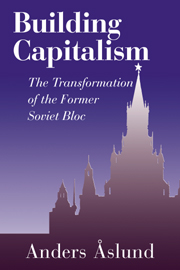Book contents
- Frontmatter
- Contents
- List of Tables and Charts
- Acknowledgments
- List of Abbreviations
- Introduction
- 1 What Communism Actually Was
- 2 The Decline and Fall of Socialism
- 3 Strategic Policy Choices
- 4 Changes in Output and Their Causes
- 5 Liberalization
- 6 Financial Stabilization
- 7 Privatization
- 8 Social Developments and Policy
- 9 State and Politics in the Transformation
- 10 Role of the Outside World
- 11 Conclusions
- Bibliography
- Index
9 - State and Politics in the Transformation
Published online by Cambridge University Press: 15 September 2009
- Frontmatter
- Contents
- List of Tables and Charts
- Acknowledgments
- List of Abbreviations
- Introduction
- 1 What Communism Actually Was
- 2 The Decline and Fall of Socialism
- 3 Strategic Policy Choices
- 4 Changes in Output and Their Causes
- 5 Liberalization
- 6 Financial Stabilization
- 7 Privatization
- 8 Social Developments and Policy
- 9 State and Politics in the Transformation
- 10 Role of the Outside World
- 11 Conclusions
- Bibliography
- Index
Summary
Our discussion has centered on rent seeking, which is an extended concept of corruption, defined as “the misuse of public power for private gain” (Rose-Ackerman 1999, p. 91). Corruption implies dysfunctional public institutions, which are poorly adapted to achieve social development goals, while the state building after communism aimed at the construction of a functional state capable of achieving social goals, such as high economic growth, the delivery of vital public goods, and a reasonable degree of equity. The politics of postcommunist transformation involved rendering such a transformation of the state politically possible.
Today, communism is already such distant history that many have forgotten that it was a system of kleptocracy, meaning that corruption was organized at the top of the government (Rose-Ackerman 1999, p. 114), working for the empowerment and enrichment of the Nomenklatura (Voslenskii 1984). Where the political regime did not change, the Nomenklatura continued its enrichment with fewer constraints than under the old system. Taxes, regulations, subsidies, prices, and privatizations were used by the kleptocrats to enrich themselves, and illegality marred the economy. The more corrupt and larger the state was, the less growth and the lower total investment. Among public expenditures, subsidies, and public investment crowded out investment in human capital through education and health care, as elsewhere in the world (cf. Tanzi and Davoodi 1997; Mauro 1995, 1998; Knack and Keefer 1995). The sizable state revenues have aggravated the harmful effects of a dysfunctional state, misallocating a large share of GDP to rent seeking.
- Type
- Chapter
- Information
- Building CapitalismThe Transformation of the Former Soviet Bloc, pp. 348 - 395Publisher: Cambridge University PressPrint publication year: 2001



